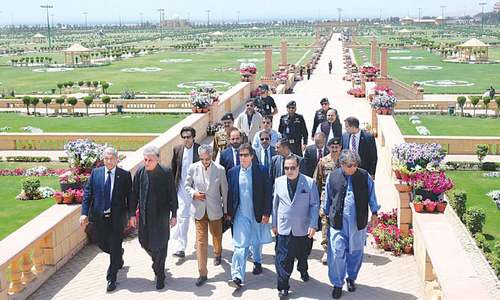The Executive Committee of the National Economic Council (Ecnec) on Thursday approved development projects worth Rs579 billion, which include improving water management, measures to increase agricultural production and revamping Karachi, among others.
During a meeting, chaired by Adviser to the Prime Minister on Finance Dr Hafeez Shaikh, the committee agreed to allocate Rs125.184bn for the 10 Billion Tree Tsunami Programme Phase-1, in which more than three billion saplings — out of which 10 per cent would be fruit trees — will be planted across the country. The government aims to promote eco-tourism, conserve and develop forests, increase rangelands and pastures, create income opportunities for local people, maintain and develop national wildlife parks etc, the adviser explained.
It was also agreed that Rs78.384bn will be allocated to the construction of the BRT Red Line Project in Karachi "with a view to enhance the quality of public transport, shift motor vehicle users to public transport and reduce traffic congestion in the city".
The project would include two corridors: a 24.2 kilometre long, dedicated corridor stretching from Numaish to Malir Halt Depot and a common corridor of 2.4 km between Municipal Park to Merewether Tower. The project also includes the construction of 29 bus stations, eight off-corridor routes and the procurement of 199 buses that will use eco-friendly bio-methane gas as fuel. Equipment for an intelligent transportation system (ITS) and security mechanism are also included in the project.
Furthermore, it was agreed that Rs16.708bn would be allocated to the Karachi Water & Sewerage Services Improvement Project (KWSSIP) Phase-I in order to improve water and sanitation services to the city.
Ecnec also approved Rs31.935bn for the Sehat Sahulat Programme, which will provide free healthcare to 2.7 million families across the country.
Eight major agriculture-related projects, worth Rs95bn, were also approved. Ecnec also approved the National Programme for Improvement of Watercourse in Pakistan Phase-II, which will cost Rs154.542bn.
Ecnec also agreed to allocate Rs46.804bn for the 500 KV HVDC Transmission System between Tajikistan and Pakistan for Central Asia-South Asia Transmission Interconnection (CASA-1000) project to ensure uninterrupted power supply to consumers and to export any surplus power to other countries.
About Rs13.103bn will be allocated to the Sindh Secondary Education Improvement Program (SSEIP), which will include building secondary schools all over the province, training teaching staff and provision of lab equipment.














































